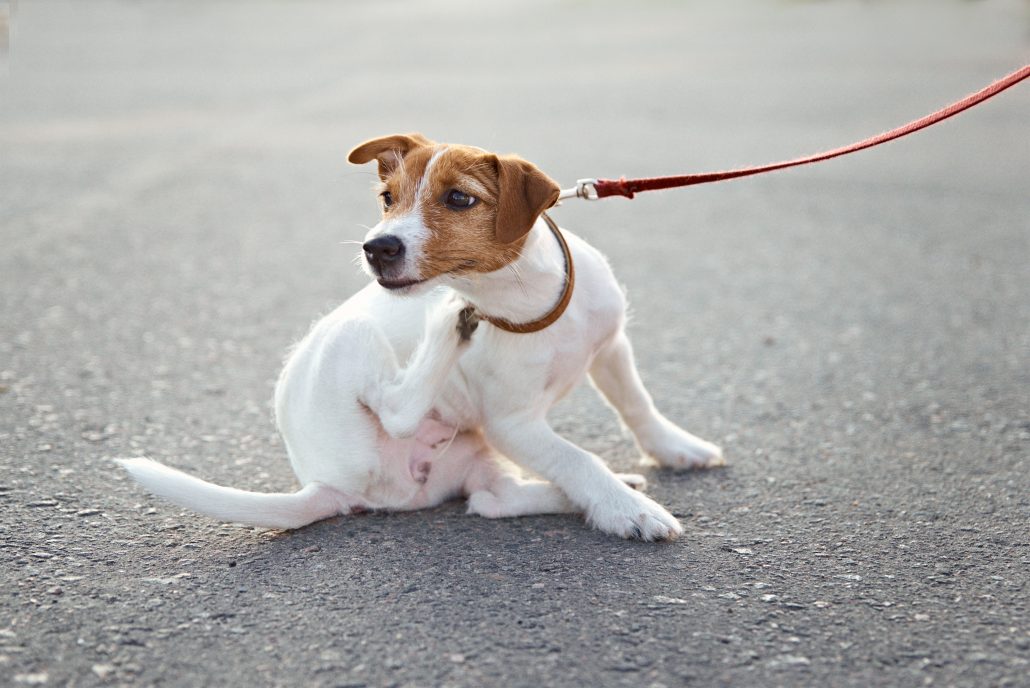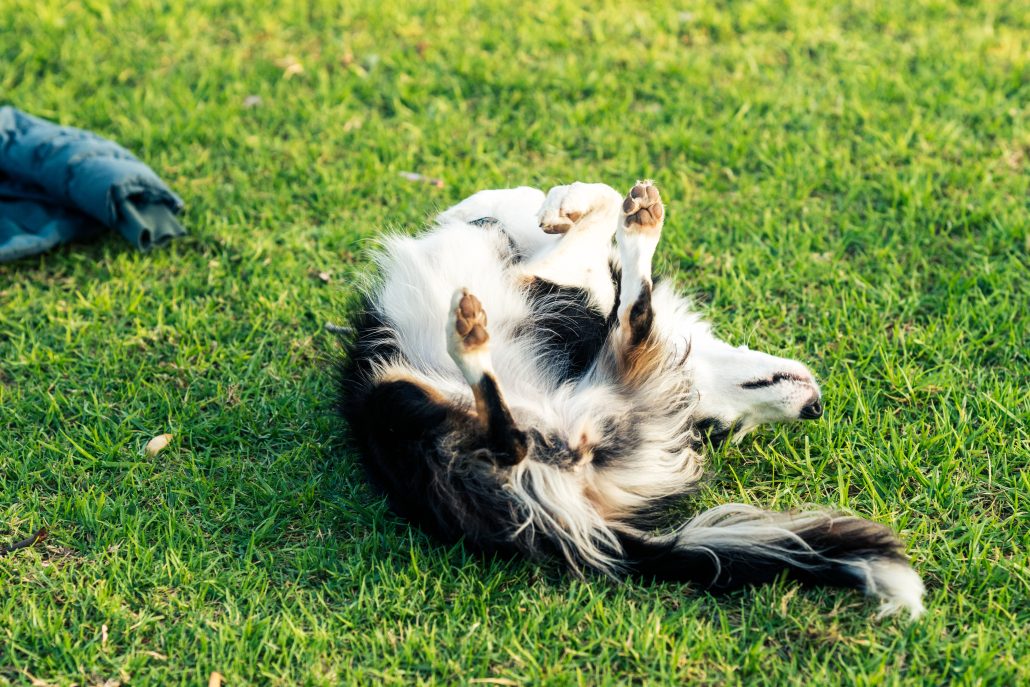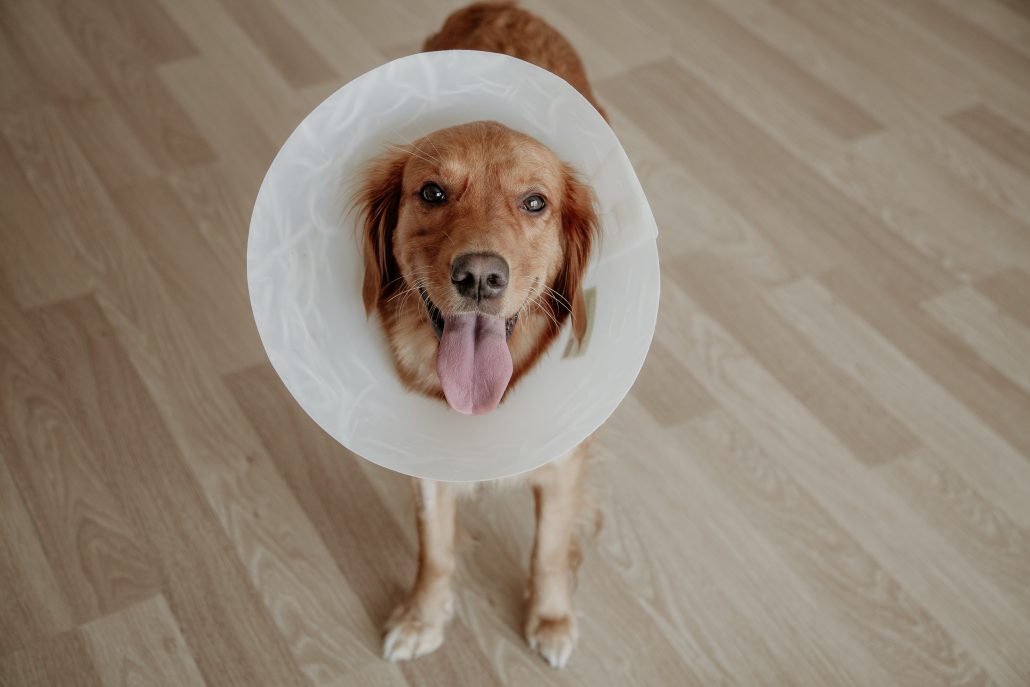While dandruff and dry skin in dogs are generally not signs of serious conditions, they can still be incredibly frustrating for both pets and their owners. Just like us humans, our beloved four-legged companions can experience discomfort and irritation due to these skin issues.
The good news is that in many cases, dandruff and dry skin are manageable, and with determination and patience, you can help your dog’s coat regain its healthy and vibrant appearance!
In this post we will explore the causes and symptoms of dry skin and dandruff in dogs and how best to treat them. By understanding the underlying factors contributing to these conditions, you will be equipped with the knowledge and tools needed to tackle them head-on!

What Exactly Is Dandruff?
Dandruff refers to the presence of dead skin cells on your dog’s coat. While it may be challenging to spot the flakes, especially on dogs with longer fur, they often become visible when they shake or lie in their beds. The causes of dandruff in dogs can vary, making it sometimes tricky to pinpoint the root cause.
Causes Of Dandruff in Pets?
Dandruff in dogs occurs when dry skin flakes accumulate and become trapped on the surface of their skin and fur. If you notice signs of dandruff in your dog, it could indicate an underlying condition contributing to the dry skin. Some common causes of dog dandruff include:
- Under-grooming: Dogs naturally groom themselves by licking, which helps remove small skin flakes from their fur. Excessive dandruff may suggest that your dog is not grooming adequately, potentially indicating an underlying health issue that is affecting their grooming behaviour.
- Parasites: Parasites like fleas, ticks, and mange mites commonly cause dry and scaly skin in dogs. Additionally, intestinal parasites such as hookworms, roundworms, and whipworms can lead to skin issues due to the nutritional depletion they cause in their hosts.
- Allergies: Allergic skin conditions can result in dry, red, cracked, and flaky skin in dogs. Inhalant allergies (e.g., pollen), contact allergies (e.g., certain fabrics, chemicals or grass), or food allergies are common sources of skin allergies in dogs.
- Hypothyroidism: Hormonal conditions, such as hypothyroidism, can also cause changes in the skin due to the body’s altered regulation of hormone production and metabolism. Hypothyroidism can result in a thinning coat, dry and brittle hair, dry skin, and hair loss along the back and tail.

Does My Pup Have Dandruff?
Skin issues can stem from genetic factors, environmental factors, nutritional deficiencies, or parasites. In some cases, a combination of treatments may be required to effectively address the underlying cause. To help you determine if your pup has dandruff, common symptoms include:
- Skin flakes: Noticeable flakes of dead skin on their coat or on surfaces where your dog rests.
- Excessive scratching: Your dog frequently scratching or itching their skin, which may be a response to the discomfort caused by dandruff.
- Red/scaly skin patches: Areas of the skin appearing red, inflamed, or exhibiting scaly patches, indicating possible irritation or underlying skin conditions.
- Excessive licking and chewing: Your dog excessively licking or chewing their skin, which can be a sign of irritation or itchiness associated with dandruff.
If you notice dry, flaky or inflamed skin, it is essential to determine whether it is scattered throughout their fur or concentrated in a particular area. Dandruff appearing in one specific spot could indicate a reaction to something your dog came into contact with, or it might be a more serious issue, such as an infection or parasite infestation.
Additionally, be on the lookout for other accompanying signs that may indicate a need for immediate attention. These signs include excessive itching, reddened skin irritation, or the presence of scaly patches of hair loss.

Treating Dry & Flaky Skin
When it comes to addressing your dog’s dandruff and dry, flaky skin, there are a few remedies you can try. However, it is crucial to consult your veterinarian to rule out any underlying conditions and ensure the most appropriate treatment approach for your furry companion’s specific needs.
Bathing:
Regular bathing can help remove excess skin flakes and promote a healthier coat. Opt for a gentle, moisturizing dog shampoo specifically formulated for dry skin. Your veterinarian can recommend suitable bathing frequencies and provide guidance on the best products to use. Similarly, oatmeal baths are known to help balance the skin and manage dandruff.
Moisturizing:
After bathing, consider applying a moisturizer or conditioner specifically designed for dogs with dry skin. These products can help soothe and hydrate the skin, reducing flakiness and discomfort.
Dietary Adjustments:
Ensuring your dog receives a balanced and nutritious diet is crucial for overall skin health. With the help of your veterinarian, you assess your dog’s current diet and determine if any dietary adjustments or supplements are necessary to support skin health. Common supplements to include in your pet’s diet is coconut oil.
Eye Issues:
The spread of infection from severe gum disease can affect the surrounding tissues, including the eyes, potentially leading to eye infections, inflammation, and related complications.
Oral Cancers:
Prolonged inflammation and damage caused by untreated gum disease increase the risk of developing oral cancers, which can further compromise your dog’s health and quality of life.
Environmental Modifications:
Creating a comfortable environment for your dog can contribute to healthier skin. Maintain proper humidity levels in your home, especially during dry seasons, as excessively dry air can worsen dandruff. Consider using humidifiers or air purifiers to improve air quality.
Veterinary-prescribed Treatments:
In some cases, your veterinarian may recommend specific treatments tailored to your dog’s condition. These may include medicated shampoos, topical ointments, or oral medications to address underlying causes, such as allergies or infections.
Read More: Why Pets Need Regular Grooming

Nurturing Healthy Skin and Coats for Dogs
By identifying the symptoms and causes of dandruff and dry skin in dogs, we have taken an important step towards addressing and managing these issues effectively. However, it is crucial to remember that each dog is unique, and what works for one may not work for another. Therefore, it requires patience and persistence to find the right approach that suits your dog’s individual needs.
With an unwavering commitment to your dog’s well-being and the guidance of our trusted veterinarian, The House Call Vet can help you navigate through the journey of combating dandruff and dry skin. We will be able to provide personalised advice, recommend suitable treatments, and monitor your dog’s progress. Get in touch today to learn more about our Brisbane veterinary services!

